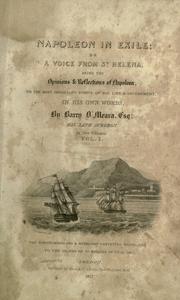
One of the most familiar quotes with which he is credited was ‘l’etat c’est moi’ – or ‘I am the state’. But by 1816 the state over which he ruled had shrunk to a corner of the small volcanic island of St. Helena in the South Atlantic. This was all that Napoleon Bonaparte could call his own after his escape from Elba, the raising of a new French Army and his final defeat at the hands of Wellington and Blucher at the Battle of Waterloo in 1815.
Sharing Napoleon’s exile in St. Helena was an Irishman, Barry Edward O’Meara, a British Navy surgeon. O’Meara was born in Newtownpark House in Blackrock, Co. Dublin in 1786. He studied medicine at Trinity and the Royal College of Surgeons and joined the army as a medic in 1804. He distinguished himself in fighting in Sicily before being court-martialled for his part in a duel in 1807. He had acted as a second to one of the participants and was kicked out of the army. What’s a young man to do? Well obviously … join the Navy. This he did almost immediately. He was still a naval surgeon in 1815 when he found himself in the right place at the right time.
Napoleon Bonaparte had been defeated at the Battle of Waterloo and was trying to escape to America where he would probably have made a fortune on the lecture circuit. Finding his way barred by a naval vessel called the HMS Bellerophon he surrendered to the commander of that ship. The vessel’s surgeon was Dr. Barry Edward O’Meara. The unemployed Emperor was impressed by the young Irishman’s linguistic and medical skills and invited him to act as his physician in the exciting new opportunity he was being offered by the British government on St. Helena. O’Meara accepted and over the next three years the two men became good friends.
O’Meara did not enter the arrangement wide-eyed and innocent. During his time with Napoleon he kept a diary with a view to future publication. The two men fared well enough on their new volcanic home under the first two post-war governors of the island. But then in April 1816 a fellow countryman of O’Meara’s. Sir Hudson Lowe from Galway, took over the position and proved himself to be a Francophobe martinet. He introduced a more spartan regime than that of his predecessors that only became even more restrictive when rumours reached the island of a plot to spring Napoleon yet again. O’Meara’s relationship with Lowe deteriorated rapidly and when he was asked to spy on Bonaparte by the Governor he returned to England.
There in 1822 he wrote Napoleon in Exile, or A Voice From St. Helena in which the hero is the late emperor (Napoleon had died the previous year possibly of stomach cancer, possibly of arsenic poisoning) and the villain is Hudson Lowe. The volume led to his name being removed from the list of naval surgeons but also attracted much support, including that of Lord Byron.
O’Meara is believed to be the only doctor to have performed a surgical procedure on Napoleon. He extracted one of the Emperor’s wisdom teeth in 1817. When he died in 1836 the tooth was auctioned and fetched seven and a half guineas. It was sold again in 2005. This time it cost the buyer £13,000.
After his St. Helena experience O’Meara became a dental surgeon, married a sixty-six year old heiress at the age of thirty-seven and was one of the founders of the Reform Club in London. He died of complications following a chill contracted while attending a fund-raising meeting organized on behalf of fellow Reform Club member Daniel O’Connell. Some accounts have him catching his death of cold at one of O’Connell’s Monster meetings – a much less mundane demise I’m sure you’ll agree.
Dr. Barry Edward O’Meara, briefly and controversially physician to Napoleon Bonaparte died one hundred and eighty years ago, on this day.

You must be logged in to post a comment.